Have you ever experienced swollen gums??
Do you have bleeding while brushing??
You suddenly got swollen gums and you don’t know why??
You have reached the right place to find all your answers. We see our patients struggling with swollen gums very frequently in our practice. They are unaware of the reason and what they need to do regarding the swollen gums.
What are swollen gums?
When the fluid accumulation in the gums increases it causes swelling in the gums, along with redness and inflammation. You might feel pain and sometimes even sensitivity in the region of swollen gums.
The best thing to do when you have swollen gums is to visit your dentist and get a complete dental examination done as almost always there is an underlying reason for swollen gums. In case you can not visit your dentist immediately, there are a few home remedies that might help in reducing the swelling. You can also contact your dentist over the phone if possible and take advice until you can visit again.
What causes swollen gums?
There are various different reasons for swollen gums.
Gingivitis
Gingivitis: “Gingiva” means gums and “itis” means inflammation. So Gingivitis is the inflammation of the gums.
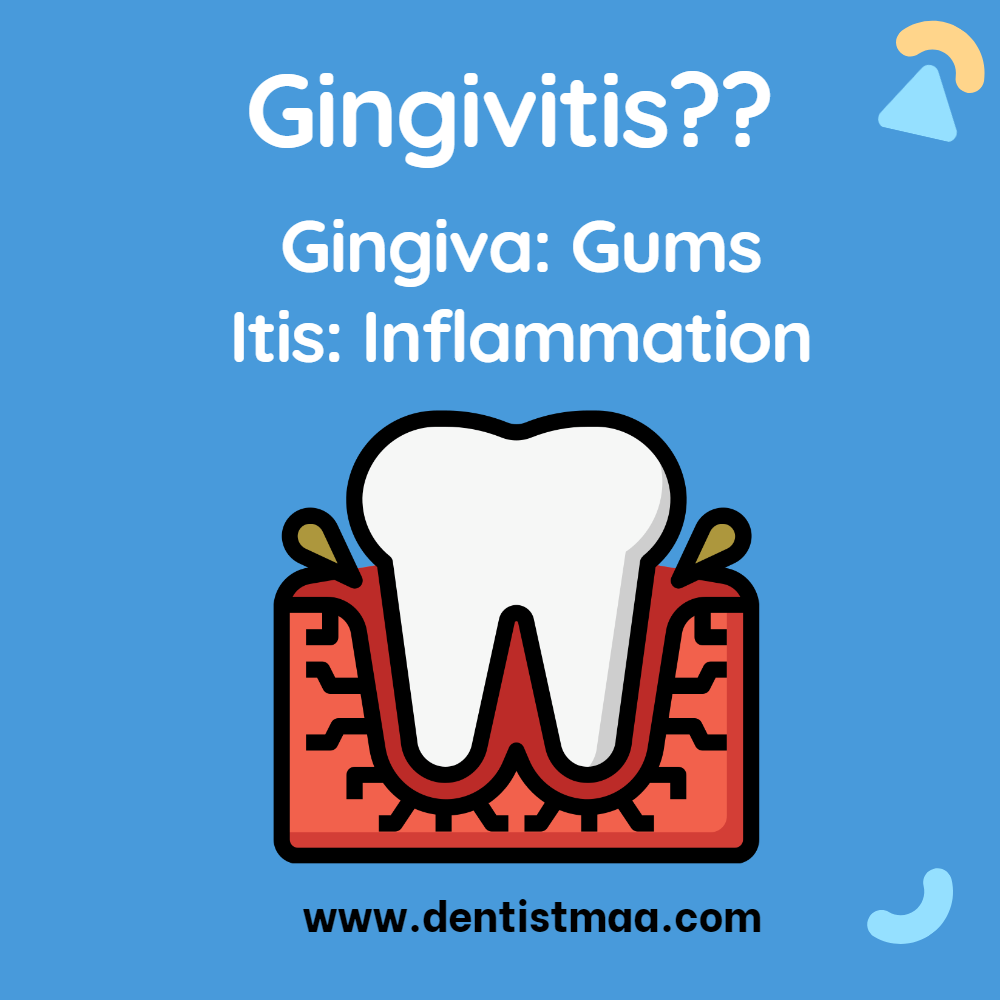
Gingivitis is the inflammation of the gums. When oral hygiene is not maintained, plaque starts depositing on the surface of the tooth. This plaque slowly starts changing into calculus (tartar) which is a hard substance that can not be removed by brushing alone. It will slowly start irritating the gums causing inflammation and swelling.
So, improper oral hygiene can be one of the main reasons for swelling in the gums, which can even cause bleeding of the gums. Brushing and flossing daily can prevent gingivitis and therefore swollen gums. If proper oral hygiene is not maintained and treatment not taken, gingivitis can turn to periodontitis which can later cause loss of bone around the tooth, the tooth is mobile, and in the end the loss of the tooth.
Infection
Any kind of infection in the mouth can cause swelling of the gums. If you have a cavity, and it is not treated, the infection can spread and cause a dental abscess which again is a type of a swelling in the gums. Pus discharge can be seen from the abscess. Root canal treatment is the choice of treatment in such cases.
Other infections like viral and fungal infections are also seen to cause swelling of the gums. Viral infections like herpes and fungal infection like candidiasis (oral thrush) which is the infection due to exaggeration of the candida albicans a normal fungus of the mouth.
Pregnancy
There is a lot of change and increase in the hormones during pregnancy. These hormones can increase the blood flow to the gums and cause swelling and irritation in the gums, this is called a “Pregnancy tumor.” Most of the time it goes away on its own after delivery. If it persists, you would need to visit a dentist and get it checked.
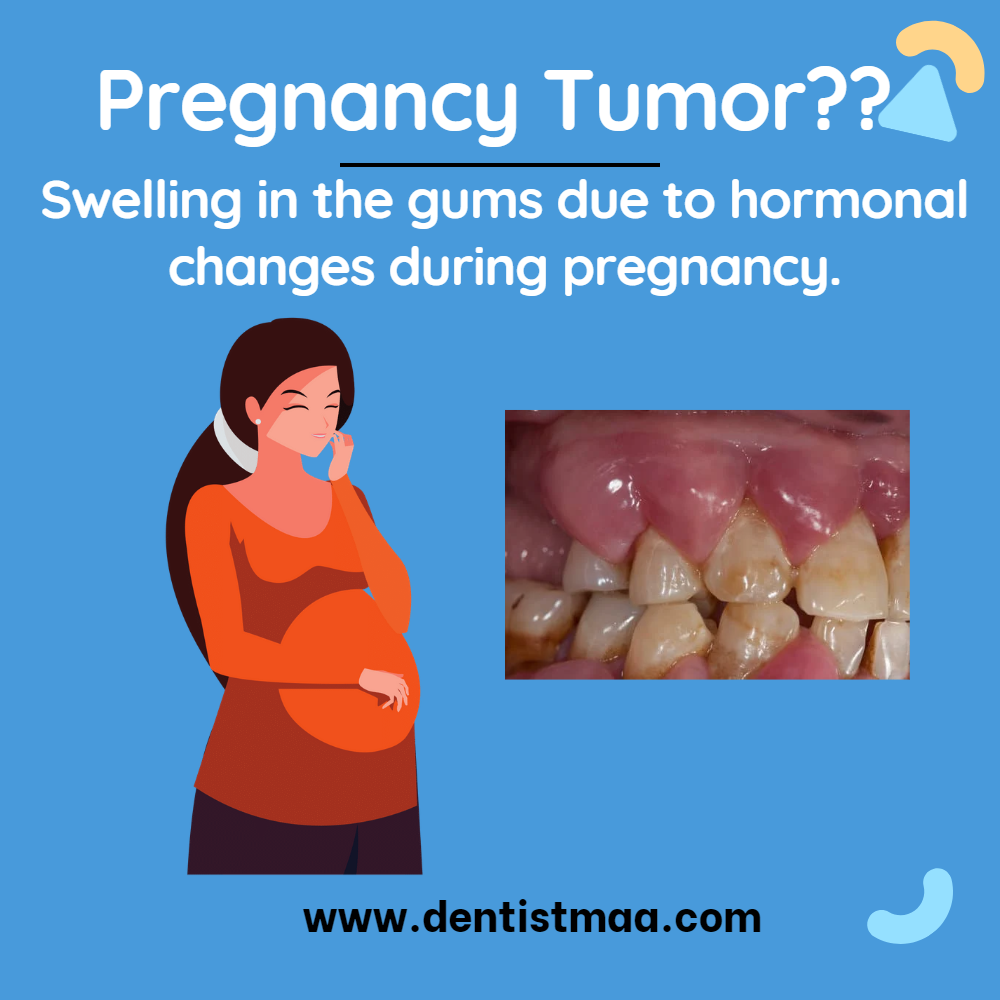
Food stuck in the teeth
Sometimes during eating something especially sharp or fibrous gets stuck in between the two teeth and causes irritation if it is not removed. This will slowly start causing inflammation in the gums and lead to redness and swelling in the affected area. The gums will go back to normal once the cause i.e. the food particle is removed. Most of the time it is seen with food like chicken and meat fibers, fibers of radish and carrot, coconut etc.
If there is a cavity in between the two teeth there might be some space that would be formed. In such cases again the food can get stuck. The other reason can be an ill-fitting crown or a bridge. Flossing and brushing can help in these cases.
Eruption of wisdom tooth
Wisdom tooth eruption can be very painful sometimes due to swollen gums. It is known as “Pericoronitis“.
Peri means “around”, Coro means “coronal surface i.e. the top surface of the tooth”, and itis means “inflammation”.
As your wisdom tooth (especially the lower wisdom tooth) erupts, it causes inflammation over the gums covering the tooth through which it is trying to penetrate. And if you have a wisdom tooth in the upper jaw chances are it would be hitting the gums over the wisdom tooth of your lower jaw, causing more inflammation and swelling. Home remedies do work to some extent and for some amount of tie in such cases, but if the angulation of your tooth is not straight and the tooth is not erupting in its position, chances are you will have to get the tooth removed. Visit an Oral and Maxillofacial Surgeon.
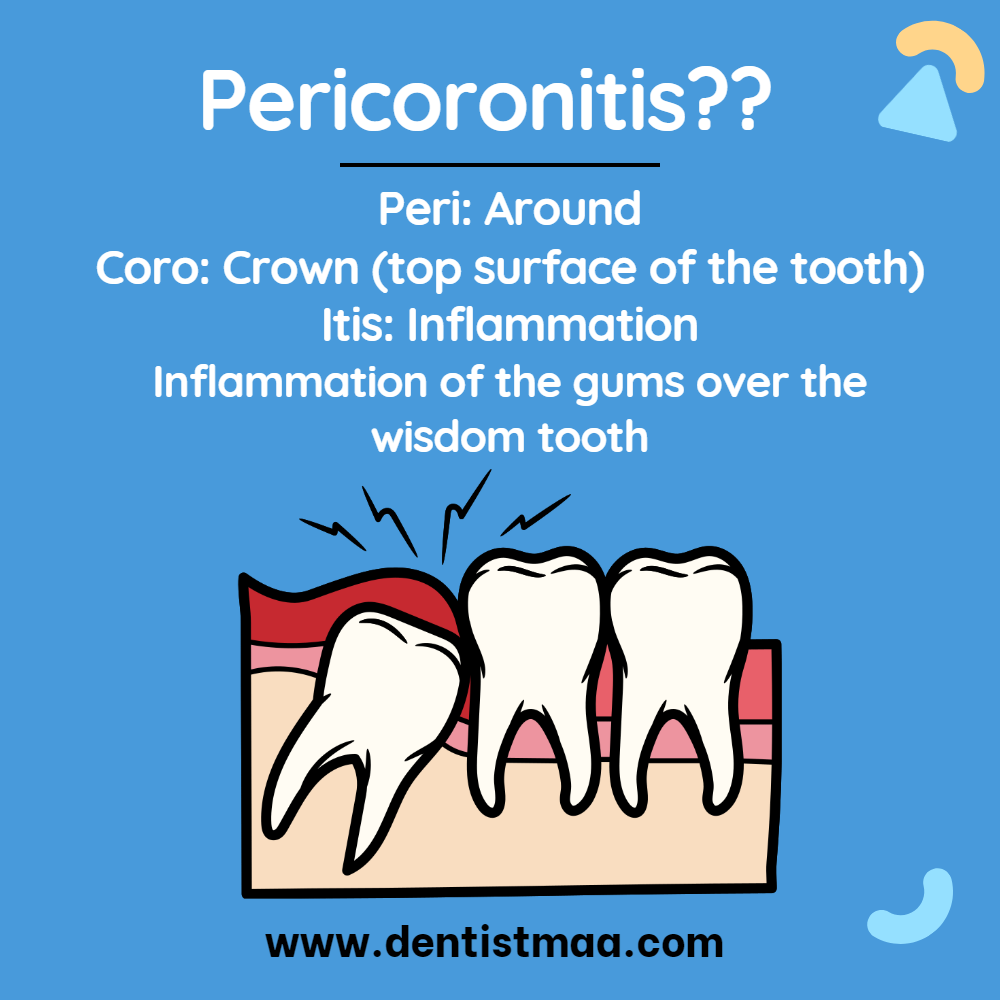
Ill-fitting dentures
Ill fitting dentures can impinge on the gums and cause swelling many a times. Make sure the denture you are wearing is comfortable and not impinging anywhere on the gums. If that is the case, you need to get your denture fixed or get a new one.
Allergy to medication
If you are allergic to some medication you might get swollen gums. In fact some people can be allergic to certain toothpastes. The best thing to do is stop the medication or the toothpaste or anything that caused allergy immediately.
Certain medicines are prone to cause swollen gums, like phenytoin used for seizure. In such cases, medication can not be stopped. You should visit your physician and tell them your concerns.
Malnutrition
Malnutrition can be one of the causes of swollen gums. A deficiency of Vitamin C can lead to scurvy. In scurvy, your gums might swell and bleed. It is not very common. It is most commonly seen in underdeveloped countries. A lack of fruits rich in vitamin C and other sources can cause scurvy.
How can you prevent swollen gums?
Yes, swollen gums can be prevented.
- Eat healthy, make sure your intake of vitamins C and B is good
- Maintain good oral hygiene. Brushing as well as flossing is very important to maintain good oral hygiene and also to prevent swollen gums
- Rinse with warm water with salt
- Incase you know you are allergic to any medicine or toothpaste, avoid it
- Maintain good oral hygiene in pregnanacy, it helps
- Take proper medication if you have any viral or fungal oral infections
- Get those impacted wisdom teeth removed
What is the treatment for swollen gums?
The most important thing to treat swollen gums is to diagnose.
When you visit your dentist, the first thing your dentist will do is
– Take a proper dental and medical history
After taking the history your dentist will
– Examine clinically
– Take X rays
Once the diagnosis is made the treatment will start.
– In case you have Gingivitis, you might need a thorough scaling i.e. cleaning of your teeth.
– In case it is an infection, and you have an abscess, most probably you will have to get a root canal done.
– In case of viral or fungal infection, your dentist will prescribe medicines.
– If your denture needs adjustments, your dentist will either adjust it or advise you to get a new one.
– In case you have an infection related to your wisdom tooth, your dentist might either prescribe medicines or advise you to get the tooth removed.
So, the treatment of the swelling depends on the reason for the swelling of the gums. So, your dentist is your best judge.
What are the home remedies for swollen gums?
You can try a plenty of things as home remedies, but still a dental visit is very important.
- Warm Saline Rinses: Take a glass of lukewarm water and mix a teaspoon of salt in it. Rinse it for 30 seconds and spit it out. Repeat it 2-3 times a day. You might get relief from swollen gums. You can also routinely use it as a mouthwash with no harmful effects. It will help in maintaining good oral hygiene.
- Turmeric: According to a PubMed-indexed study done in 2015, turmeric helps in reducing gingivitis, therefore swollen gums with its anti-inflammatory properties. You can use a turmeric gel available in the market, and use it to brush. It might help in reducing plaque deposits.
- Aloe Vera: Aleo vera is again said to help in reducing the swelling in the gums. Many mouthwashes comes with aloe vera in them. You can also take aloe vera from the plant directly and switch it and spit it out.
- Essential Oils: Mouthwash containing essential oils have an anti-inflammatory effect and can help in reducing inflammation of the gums. You can use the mouthwash twice daily. The essential oils used can be peppermint oil, tea tree or thyme oil.
If you are using the oil directly, mix 3 drops of any of the oil in water and swish for 30 seconds and spit.
When do you need to visit your dentist?
Only home remedies some times do not help, and you might need to visit a dentist.
- When you have constant pain in your gums
- When there is bleeding from the gums
- When you have toothache along with swollen gums
- When your denture is impinging your gums
Even when you are fine after following the home remedies, a visit to a dentist is a must. In fact once every 6 months, you should visit a dentist for a routine dental examination. The same habit should be instilled in the children as well.
The Takeaway Message
Swollen gums always have an underlying reason, and to prevent it from reoccurring it is important to get a diagnosis done. You can keep following your home remedies along with a proper diagnosis and treatment from your dentist.
How do I reduce gum swelling?
The best is to visit a dentist and get it checked. Your dentist will tell you the underlying reason and help you get quick relief. At home, you can do rinses with warm water with salt to reduce the swelling and pain. If you have a dental abscess home remedies will not work.
Why are my gums swollen with braces?
When you have braces, oral hygiene is difficult to maintain and the plaque keeps depositing. This leads to the accumulation of bacteria and therefore swollen gums. Maintain good oral hygiene, use an orthodontic toothbrush, and rinse regularly so your gums with be healthy.
Why is my gums swollen between my teeth?
Gingivitis is one of the main reasons for swollen gums. The food keeps depositing in between the teeth which causes inflammation and swelling. Only brushing in these cases will not help. Flossing is very important. Floss daily to avoid swollen gums between the teeth.
What causes gums to swell or become painful?
Gingivitis i.e. the inflammation of the gums is one of the main reasons for the gums to swell or become painful. Another reason can be a dental abscess. Gum swelling can also be seen during pregnancy or when you are taking certain medications.
How long will it take for my gums to become less swollen?
It takes a few days to a week for the gums to come back to normal. If you have a dental abscess, you need to start with treatment right away.
How do I reduce gum swelling after flossing?
Avoid flossing for a few days in that area. Rinse your mouth with a glass of luke warm water with one tea spoon of salt 3-4 times a day.
Can PCOS effect gum health?
Yes, PCOS is said to affect gum health, especially when gingivitis is already present. Women with PCOS are more prone to gingival inflammation during pregnanacy.
Does a gum infection cause jaw pain and swelling?
Yes, if you have an abscess in your gum it can cause swelling in relation to your jaw and also pain. In such a case visit a dentist and get your treatment started.
Disclaimer:
This blog provides general information about how to treat swollen gums. The opinion and content on this blog are only for conversational purposes and should not be interpreted as medical or dental advice about any particular individual. If the reader or any other person has a medical or dental concern, he or she should consult with an appropriate licensed medical or dental physician or a health care provider.
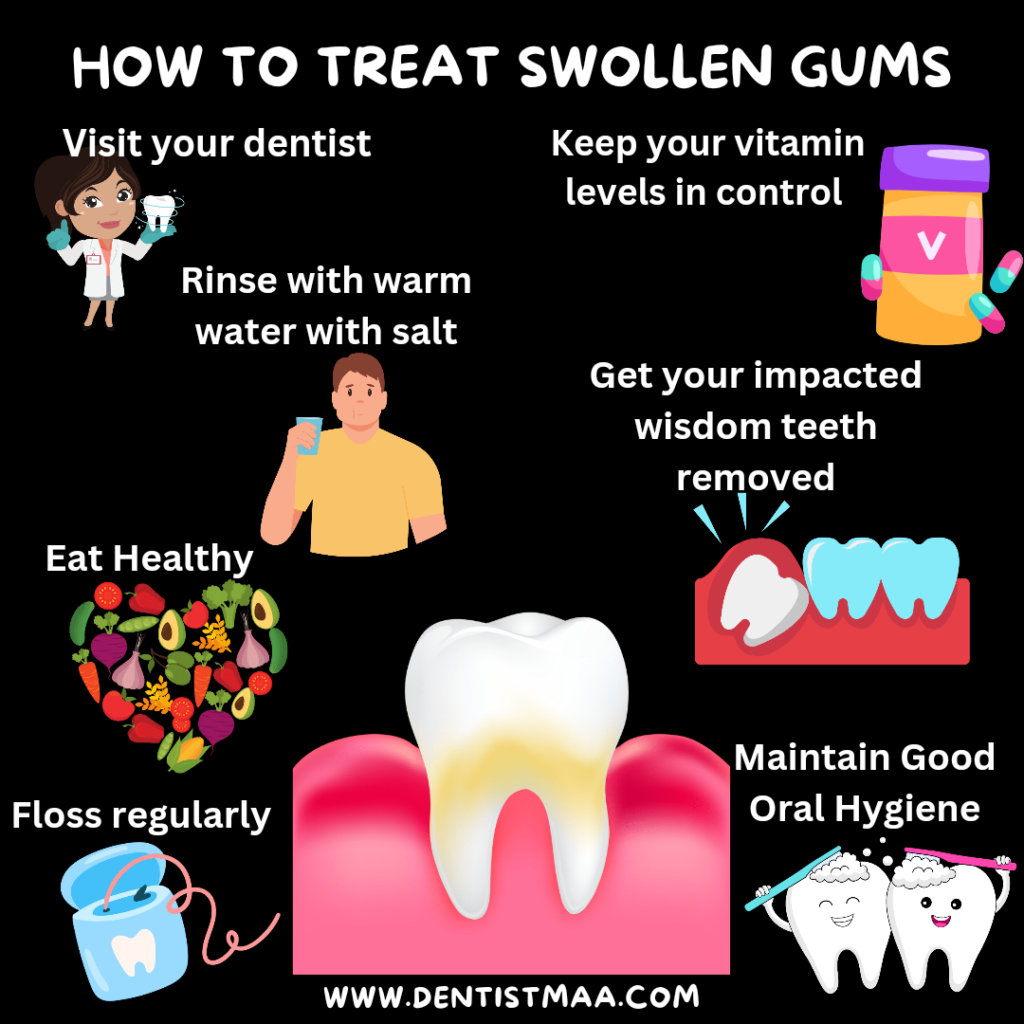

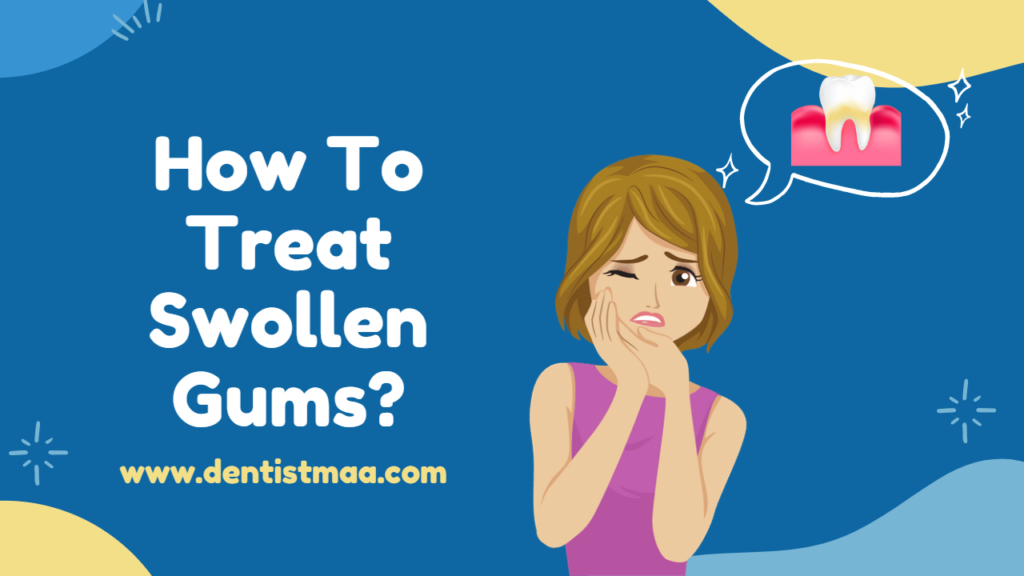
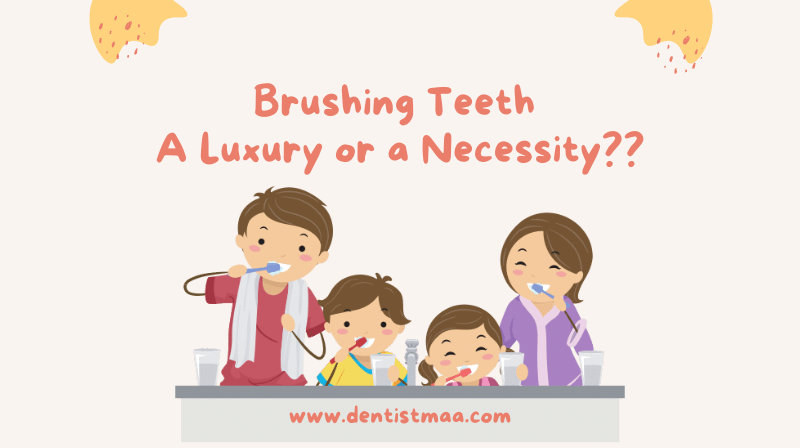

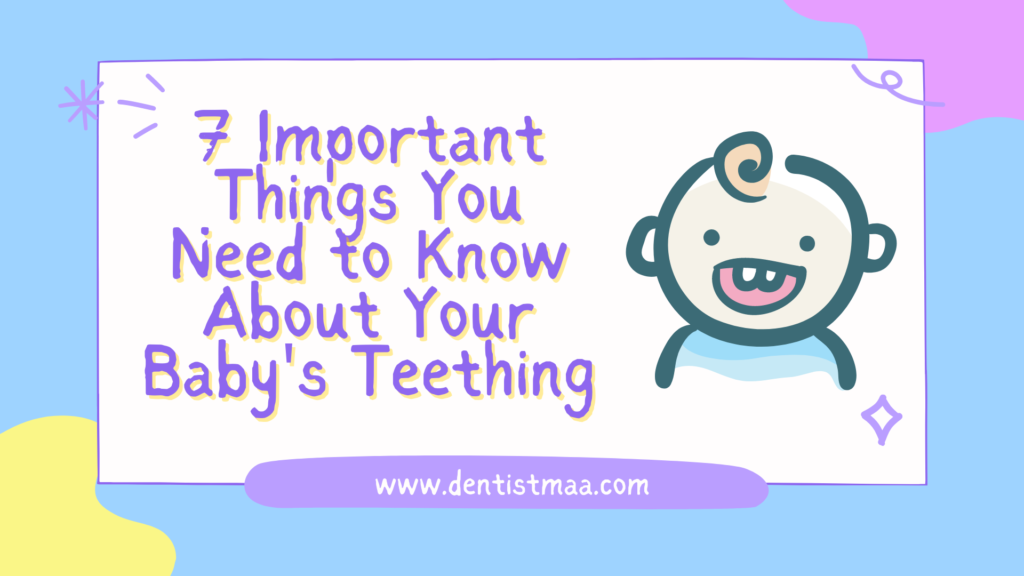
Pingback: Should I get my wisdom tooth removed? - 32 Sparklets | Dentist In Mohali | Best Dentist in Mohali
Very nice article about gum problems